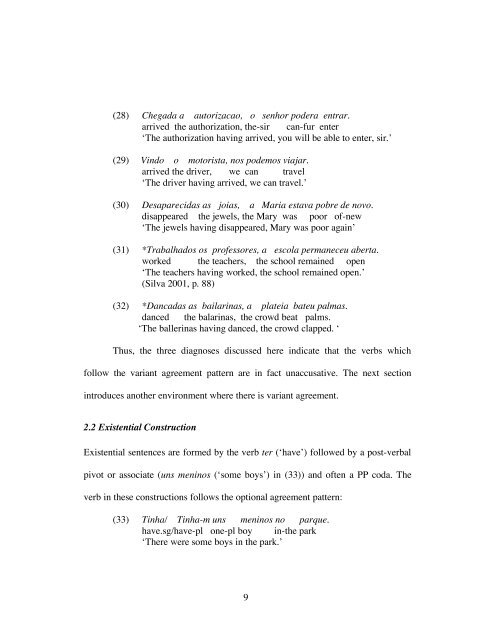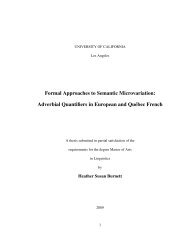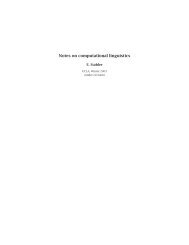Post Verbal Subjects and Agreement in Brazilian Portuguese
Post Verbal Subjects and Agreement in Brazilian Portuguese
Post Verbal Subjects and Agreement in Brazilian Portuguese
You also want an ePaper? Increase the reach of your titles
YUMPU automatically turns print PDFs into web optimized ePapers that Google loves.
(28) Chegada a autorizacao, o senhor podera entrar.<br />
arrived the authorization, the-sir can-fur enter<br />
‘The authorization hav<strong>in</strong>g arrived, you will be able to enter, sir.’<br />
(29) V<strong>in</strong>do o motorista, nos podemos viajar.<br />
arrived the driver, we can travel<br />
‘The driver hav<strong>in</strong>g arrived, we can travel.’<br />
(30) Desaparecidas as joias, a Maria estava pobre de novo.<br />
disappeared the jewels, the Mary was poor of-new<br />
‘The jewels hav<strong>in</strong>g disappeared, Mary was poor aga<strong>in</strong>’<br />
(31) *Trabalhados os professores, a escola permaneceu aberta.<br />
worked the teachers, the school rema<strong>in</strong>ed open<br />
‘The teachers hav<strong>in</strong>g worked, the school rema<strong>in</strong>ed open.’<br />
(Silva 2001, p. 88)<br />
(32) *Dancadas as bailar<strong>in</strong>as, a plateia bateu palmas.<br />
danced the balar<strong>in</strong>as, the crowd beat palms.<br />
‘The baller<strong>in</strong>as hav<strong>in</strong>g danced, the crowd clapped. ‘<br />
Thus, the three diagnoses discussed here <strong>in</strong>dicate that the verbs which<br />
follow the variant agreement pattern are <strong>in</strong> fact unaccusative. The next section<br />
<strong>in</strong>troduces another environment where there is variant agreement.<br />
2.2 Existential Construction<br />
Existential sentences are formed by the verb ter (‘have’) followed by a post-verbal<br />
pivot or associate (uns men<strong>in</strong>os (‘some boys’) <strong>in</strong> (33)) <strong>and</strong> often a PP coda. The<br />
verb <strong>in</strong> these constructions follows the optional agreement pattern:<br />
(33) T<strong>in</strong>ha/ T<strong>in</strong>ha-m uns men<strong>in</strong>os no parque.<br />
have.sg/have-pl one-pl boy <strong>in</strong>-the park<br />
‘There were some boys <strong>in</strong> the park.’<br />
9

















